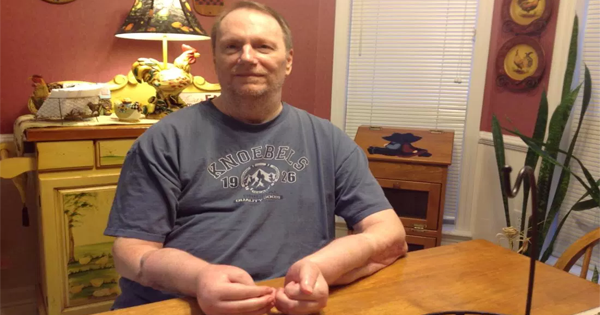Advertisement
In 1999, Jeff Kepner contracted a strep throat infection that ended up causing sepsis in his hands. Because of the bacterial infection, Kepner had to have his hands removed and had prosthetics fitted in their place. Although the transition wasn’t easy, Kepner was still able to keep his job and drive himself around.
In 2009, Kepner was approached by Dr. W.P. Andrew Lee at Johns Hopkins University with the offer of replacing Kepner’s prosthetics with a donated pair of hands. Kepner agreed, believing that having another set of human hands would improve his life – much like receiving a heart transplant would improve a patient’s life.
Before he went through the nine-hour surgery, Kepner knew that there would be risks. He was the first person who would ever undergo a hand transplant surgery, but he assumed that if all else failed, he could simply have the transplants removed.
Unfortunately, neither of Kepner’s speculations ended up being the case at all.
“From day one I have never been able to use my hands,” Kepner said. “I can do absolutely nothing. I sit in my chair and wear my TV out.”
Kepner’s transplanted hands never ended up working for him and remain non-functional to this day. His greatest wish is to now have them removed.
Dr. Vijay Gorantla, an administrative medical director at Pittsburgh Reconstructive Transplant Program at UPMC, has warned Kepner that reversing the transplant surgery isn’t as simple as it sounds, and perhaps isn’t even a viable option.
According to Dr. Gorantla, even if Kepner were to partially remove his donated hands, he would still only be able to improve the functionality of his hands if he underwent “additional, minor surgical procedures – and commit[s] to more physical therapy.” Even then, taking these steps would only “improve the function of his hands to help him with activities of daily living.”
This would not be a long-term solution in the slightest.
At present, Kepner continues to be plagued by his problem. None of his original surgeons have reached out to him at all in recent years, to check up on the status of his health, post-op.
Kepner struggles each day with his day-to-day living habits and says his quality of life has taken a serious toll. With prosthetics, he was still at least 75% functional, but now, he’s completely non-functional and has to rely on his wife to help him throughout the day.
The Kepners have since started a GoFundMe page in hopes of raising money to compensate for the medical costs they’ve accrued over the years.




